WSCF-EUROPE ANNUALREPORT 2018-19


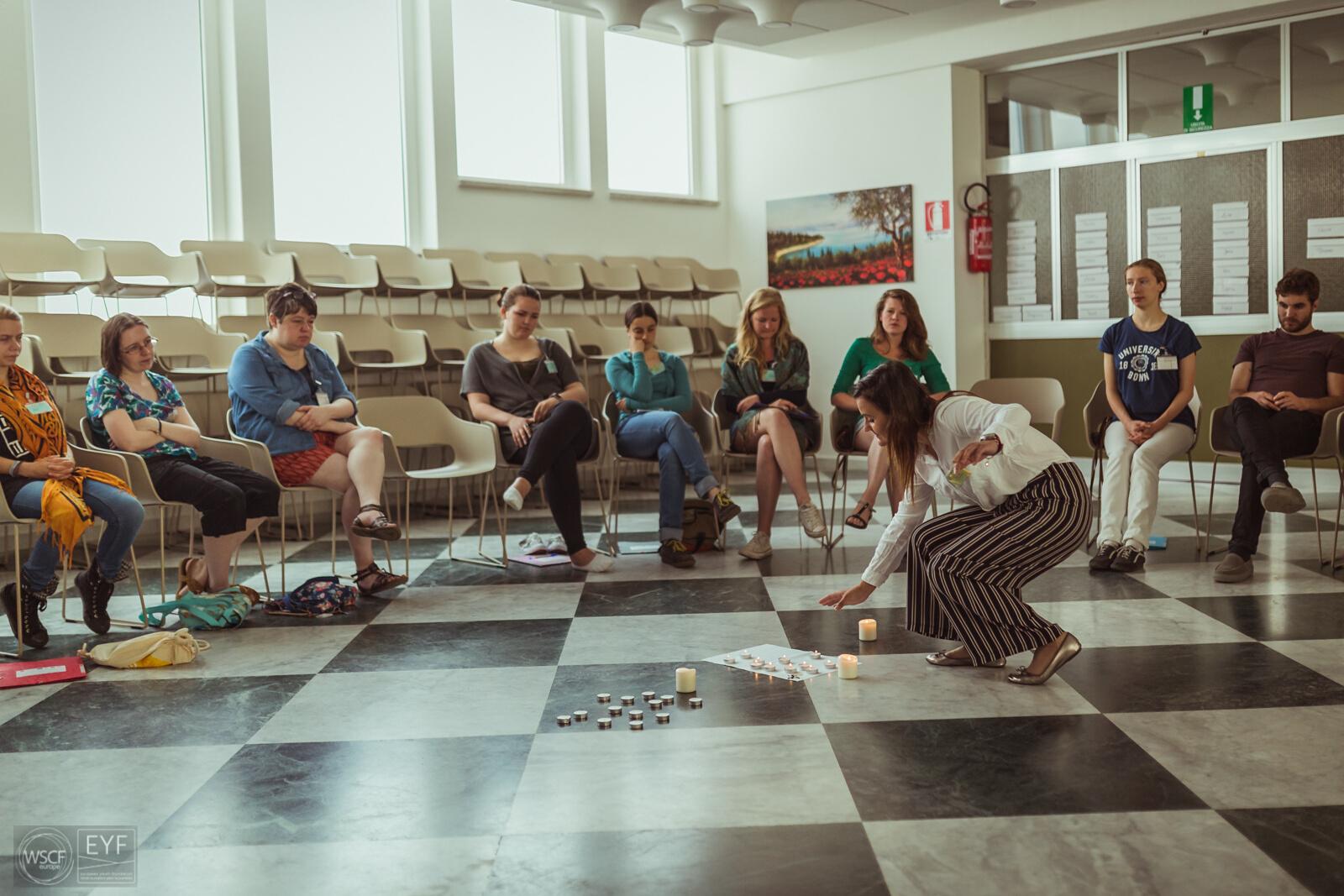




WSCF-EuropeChairperson, 2013-19
In 2018, we focused our attention on the areas of solidarity, justice and peace, and we translated these concepts into very concrete events focused on our personal and societal life in Europe. Peacebuilding focused on our conflicts, on many levels, looked at from multiple dimensions, as it is the traditional way in which WSCF considers many issues We used gender, biblical, human rights, psychological, political, legal, ecological and other lenses to understand and address this difficult topic. Solidarity and justice have been underlying themes of our work, as we set to bring attention to all the injustices behind the refugee crisis in Europe. Our international training sessions, conferences and campaign to educate students and young people and raise their understanding of media literacy, aimed to empower them to seek truth in the information they are presented with and to hear and learn from the stories of people on the refugee path.
Inclusion and diversity are concepts that mean something to each of us across Europe, and even if some of us were impacted more, and some of us less, by the refugee crisis, we all critically reflected on, learnt about and took action to advocate for inclusion and diversity as positive forces for everyone’s life
Thankyouforyourtimeandinterestinthe missionofWSCF-Europewhich,withitssmall yetimpactfulwork,bringsforwardefforts towardspeace,dialogueandjustice.

In 2018, we were especially proud to organise an intercultural training with the Council of Europe – the study session “How is Peace Possible?”, that brought European and Middle East youth together. Our learning and education programs delivered for more than 100 young people across Europe and reached digitally more than 1000 people – and they would not have been possible without our team!
2018 was the first full year for a newly-elected Regional Committee, that I had an honour to lead for the fifth year and which was formed by: Emanuelle de Bettini, Clare Wilkins, Lina Leonaviciute, Luise Klein, Pavlina Manavska, Christiane Gebauer, Annika Foltin and Krista Autio. Our volunteering Board’s commitment sustained the work and life of the Federation. Our staff members were also, once again, a stepping stone of all our work. I have always had a great appreciation for our staff members, who all go the extra mile in their jobs, every day, with their impressive attitude. Big thanks to Natia Tsintsadze, Maria Atanasoaei, James Jackson and Melany Bresciani; and my special appreciation to a volunteering Board member, Pavlina Manavska, for her extraordinary service to WSCF-Europe in 2018.
In 2019, the Board, continuing to be powered by great volunteering commitment, organised an intercultural ecumenical training in Georgia, titled “Shared Future, Shared Responsibilities“, a training session in the Netherlands, focused on combating youth extremism, and an all-year-round study and campaign addressing youth extremism in Europe 2019 was my sixth and final year of leading WSCF-Europe A lot was invested in preparing the Regional Assembly to find a new, committed leadership team, to gather more members and expand our community, to gather more friends and partners, and to make meaningful connections on topics that matter to us all Importantly, we also used this opportunity to prepare and empower the community of member movements in Europe for the WSCF General Assembly, which was due to happen in June 2020. Our connections with our friends in the World Council of Churches, the Conference of European Churches and the Ecumenical Youth Council in Europe were f h d f d more ways to common topics

Iexpressdeepgratitudetoeveryonewithwhom wecouldhelpourcommunitiesinEurope,and beyond,tobecomemorepeacefulandjust.Iam gratefultoourteam,ourpartners,andallthe peopleofgoodwillpresentintheteamandlifeof WSCF-Europein2018and2019.Itwasablessing formetoleadandbepartofthewidedialogical communityinthislastsixthyear,intheroleof Chair,servingthemissionalongsidemy wonderfulteam.
I thank God for all the people who - in ways visible and not visible - helped the mission of WSCF-Europe with their good will. I value all financial and non-financial support, in all its forms, that helped WSCF-Europe to realise its envisioned projects May God bless you, all, for giving in good spirit. WSCF-Europe in 2018 and 2019, as in years and decades before, showed we live from motivation, volunteers and also financial resources. May there always be motivated people, who will keep spreading the message of justice, peace and dialogue, as we have done since 1895 And, importantly, may we always have Jesus present, through prayer, uniting us in our actions and efforts. As it is said to us in Psalm 127: “ ... its builders labour in vain, unless the Lord builds the house”. May we always build places of justice and peace in us and for others with God guiding us!
Wehavehadtwoamazingyears
championingyouthvoiceacross Europeandbeyond.At the WSCF-Europe, we believe that our faith helps us to become the best we can be. This ultimately means to promote, protect and serve inclusive societies through empathy, respect and love for each other As a Christian youth movement of long-standing tradition, we are committed to support young people across the continent, not only to practice their religions freely, but also in respect to the rights of others, in a diverse and inclusive society We do this with, and through, our network of Student Christian Movements (SCMs), from across Europe, and our partner organisations, from other faith-based and secular organisations. We look to work with young people who wouldn’t otherwise have access to the kind of opportunities we offer
Many young people across Europe are denied their basic human rights, including the right to freedom of religion and education Promoting human rights education among disadvantaged youth remains one of our strategic priorities in Europe, which also ties closely with all our global priorities.
 NatiaTsintsadze WSCFExecutiveinEurope WSCFProgrammeDirector forInterfaithDialogue
NatiaTsintsadze WSCFExecutiveinEurope WSCFProgrammeDirector forInterfaithDialogue

During the last two years, we have seen many positive actions undertaken by young people in promoting human rights, inclusiveness and human dignity, sometimes despite significant challenges We will continue to progress this agenda through delivering human rights education, training sessions, as well as through high-level advocacy work in promoting access to these opportunities for disadvantaged youth.
We believe that nothing should be done about young people without young people, and continue to provide a united voice and support for young people across Europe. WSCF-Europe recognises that all young people should have the right to be represented and get their voice heard in local and national decision-making processes Through our high-impact work, we ensure that the calling for youth participation in democratic processes across Europe should not be just a passing phase, but that it should have a lasting impact, in order to benefit and improve the chances that young people have in their own lives, as well as the lives of others. We feel that this should be universally recognised as a force of good, regardless of the way in which young people choose to participate and make a difference.
WSCF-Europe has always been a champion for Christian youth and for the crucial network of youth movements that support them Our members tell us how important this role is: at a time when funding reductions and right- wing political agendas have hit youth organizations so hard, their voices and the views of the young people they support need to be heard.
WSCF-Europe continues to challenge growing systemic, practical and individual injustices and inequalities facing young people. Many of our beneficiaries live and grow up in separate and divided societies. The legacy of conflicts, nationalism and destitution often affects young people’s attitudes, behaviours and choices. Young people want to change this space and to create one which is more inclusive, outward and forward looking. They may appear to be disinterested in politics, but they are actively involved in social campaigns and principled protest. Over the last two years, we advanced our efforts through youth-led campaigns and social action, events, activities and research that analyse, prevent and combat discrimination, radicalisation and exclusion
We have been on a journey of change and growth that will continue into 2020-2021, as the organisation is preparing for its General Assembly. We are looking forward to the next term of the new leadership and developing a new strategy, ensuring that youth voices remain at the heart of everything we do, and that we better focus our resources on delivering activities that best respond to the needs and challenges of young people in Europe. We know that the young people who are involved in our programmes come from diverse backgrounds and that they gain so much from using their voice for social and political change, and we want to showcase that even more, ensuring that young people are seen as a positive force for good in their communities, and that their views are sought, valued and acted upon

I'dliketothankourvolunteersandstaff,member movementsandsupporters,fortheirenormous contributiontotheprogressmadesofar.Ithas beenanhonourtoservetheseamazingyoung peopleandwewillcontinuetodosoin2020-21.

Livingfaithtogetherforjustice!
InspiredbyourcommonChristianfaith:
Wecampaignforajustandpeacefulworld.
WeareaprogressiveChristianvoice,awareofourpoliticalresponsibility. Weeducateandempoweroneanothertobeleadersandcriticalthinkers.
Webuildmeaningfulrelationships.
Weshareandcultivateourpassions. Weembracediversityasagift.
WeprayandworshipGodtogetherasonecommunity. WeexploreourcommonfaithinJesusChrist,whichmakesusone.
Puttingourfaithintoactiontocontributetothe renewaloftheecumenicalmovement,andto promotejusticeandpeaceintheworld.
Peacebuildinganddialogue
Interfaithdialogueandcooperation
Ecologicaljustice
Higher-education
Identity,diversityanddialogue
Bibleandtheological
Advocacyandsolidarity
TransformativeDiakonia
Capacity-building
Movement-building
WSCF-Europe was founded as a regional body of the World Student Christian Federation (WSCF) in 1968 Before having a designated office and staff in Europe, all activities were managed through the Global Office, since its foundation in 1895. WSCF-Europe maintains its close ties with the Global Office and with all the other WSCF regions, supporting their efforts as one global movement. However, WSCF-Europe also has its own strategic objectives and priorities, in line with the needs and challenges of its member movements in Europe
WSCF-Europe is an umbrella organisation that serves 30 movements, known as Student Christian Movements (SCMs), across 29 countries in Europe Empowering and inspiring Christian young people to serve humanity, within and beyond their communities, has always been the basis of our work. We aim to translate our Christian values and principles of love and unity in serving the most deprived and vulnerable people We work towards building a just and peaceful society, where all humans are respected and represented in the development of their shared future.
WSCF-Europe is led by an European Regional Committee (ERC) The members of the ERC are democratically elected by the European Regional Assembly (ERA) every two years. At the last ERA, which took place in October 2019, in Denmark, we’ve asked our movements to do an analysis of the strengths of WSCF-Europe.

'What are the strengths of European SCMs?'
AUSTRIA
EvangelischeHochschulgemeinde inÖsterreich
Email: ehg-world@evang at
BELARUS
Centre"Ecumena"
Email: ecumena@ecumena.by
BRITAIN StudentChristianMovement
Email: scm@movement.org.uk
CZECHREPUBLIC
Oikumené–AkademickáYMCA
Email: acadymca@etf.cuni.cz
DENMARK
YMCAandYWCADenmark
Email: mhs@kfum-kfuk.dk
FINLAND
OrtodoksinenOpiskelijalitto
Email: ool.ps@ort.fi
SuomenKristillinenYlioppilasliitto
SKY/FinlandsKristliga Studentförbund
Email: paasihteeri@sky-fks.fi
AffiliatedMovements
FRANCE Associationdes
EtudiantsProtestantsdeParis
Email: foyeraepp@orange.fr
GEORGIA
YoungChristiansforPeaceandDemocracy
Email: ycpd ycpd@yahoo.com
GERMANY ESG-VerbandderEvangelischen StudierendengemeindeninDeutschland
Email: esg@bundes-esg de
IRELAND SCMIreland
Email: scmireland@gmail.com
ITALY
FederazioneGiovanileEvangelicaItaliana
Email: segreteria.fgei@gmail.com
LITHUANIA
VilniausAkademinioEvangelikuLiuteronu
JaunimoDraugija
Email: velayfacad@netscape.net
NETHERLANDS
TheInnBetween
Email: szilvia.fehervari@maastrichtuniversity.nl
NORWAY
NorgesKristeligeStudentforbund
Email: post@forbundet.no
ARMENIA
YouthUnionofJervezh
Email: jervezh youth@yahoo.com
BULGARIA
OrthodoxCenter“Prof.TotyoCoev”
Email: christian students@abv.bg
POLAND
FellowshipofOrthodoxYouthinPoland
Email: bractwo zc@poczta onet pl
SLOVAKIA SCMSlovakia
Email: sajdus@yahoo.com
SWEDEN
KristnaStudentrörelseniSverige
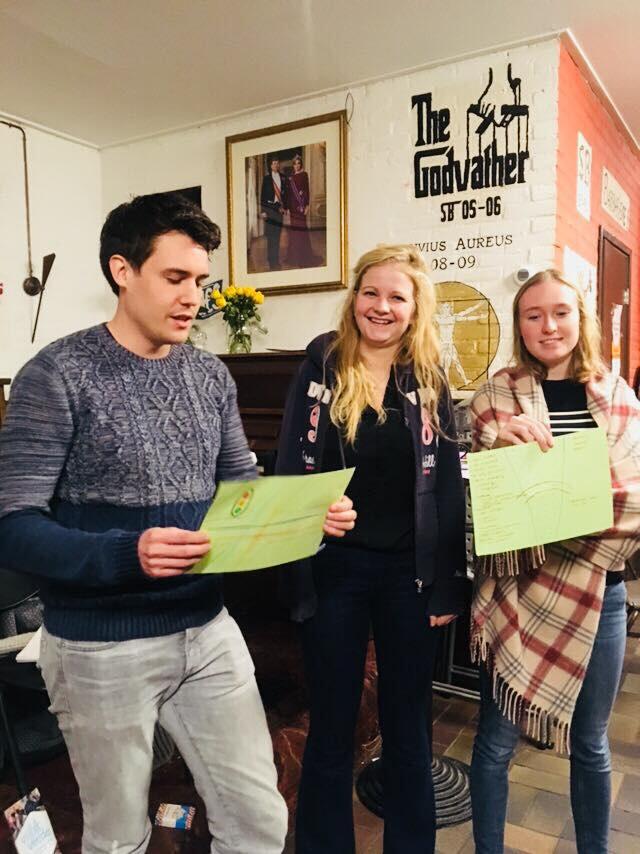

Email: kriss.sthlm@gmail.com
NETHERLANDS
NieuweAfdelingUtrechtderSocietas StudiosorumReformatorum(S.S.R.-N.U.)
Email: praeses@ssr-nu nl
ARMENIA
StTrinityYouthOrganization
Email: trinity.youth.peace@gmail.com
CROATIA
StudentskiEvandeoskiPokret(STEP)
Email: info@step hr
CZECHREPUBLIC
YWCAvČeskérepublice
Email: kozderova@ywca.cz
FRANCE
L’ActionChrétiennedesEtudiantsRusses
–MouvementdeJeunesseOrthodoxe
Email: secretariat@acer-mjo org
ICELAND
KristilegaSkólahreyfingin(KSH)
Email: sveinn@ksh.is
MACEDONIA
YouthGroupoftheUnitedMethodist ChurchinSkopje
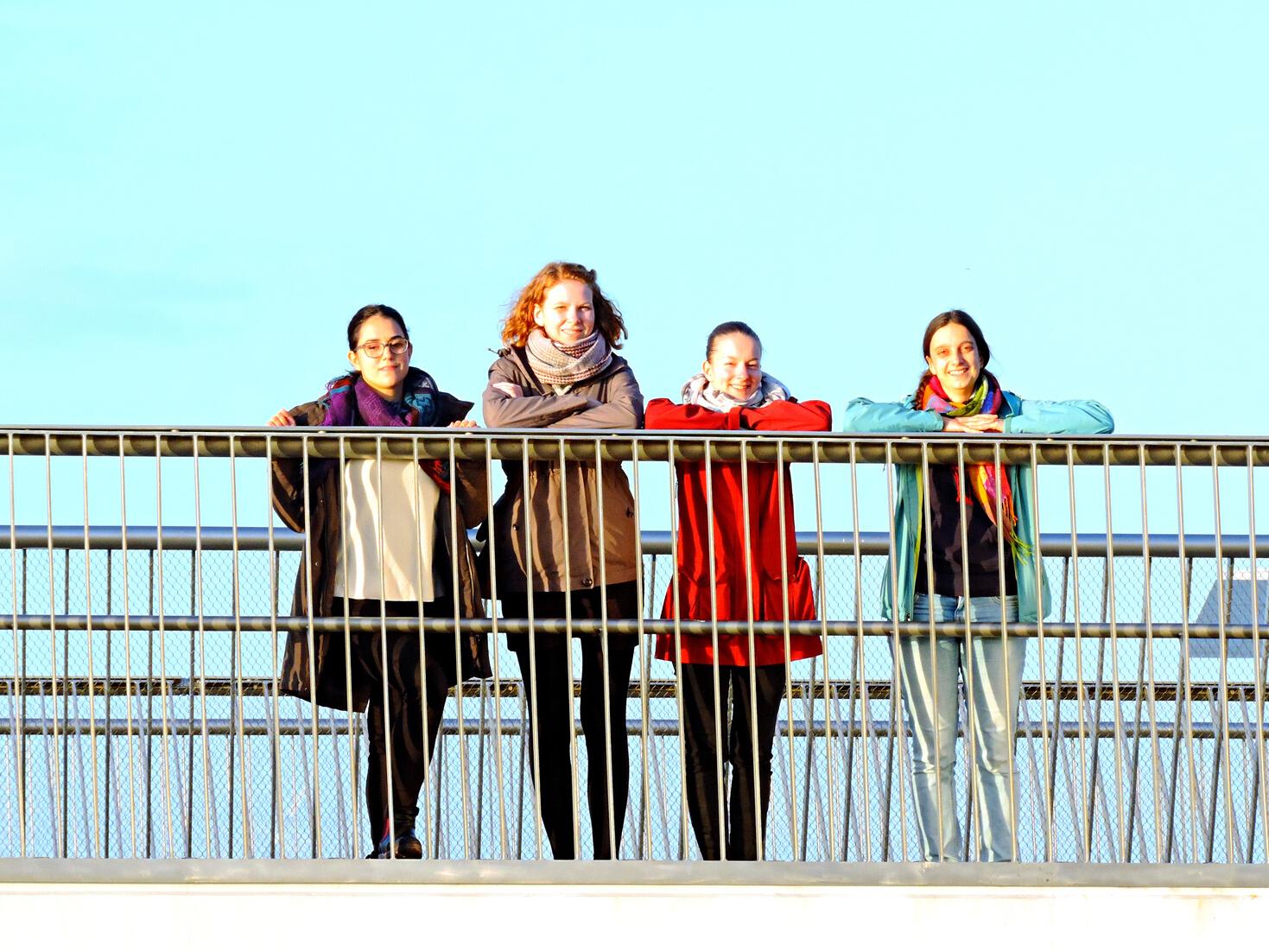
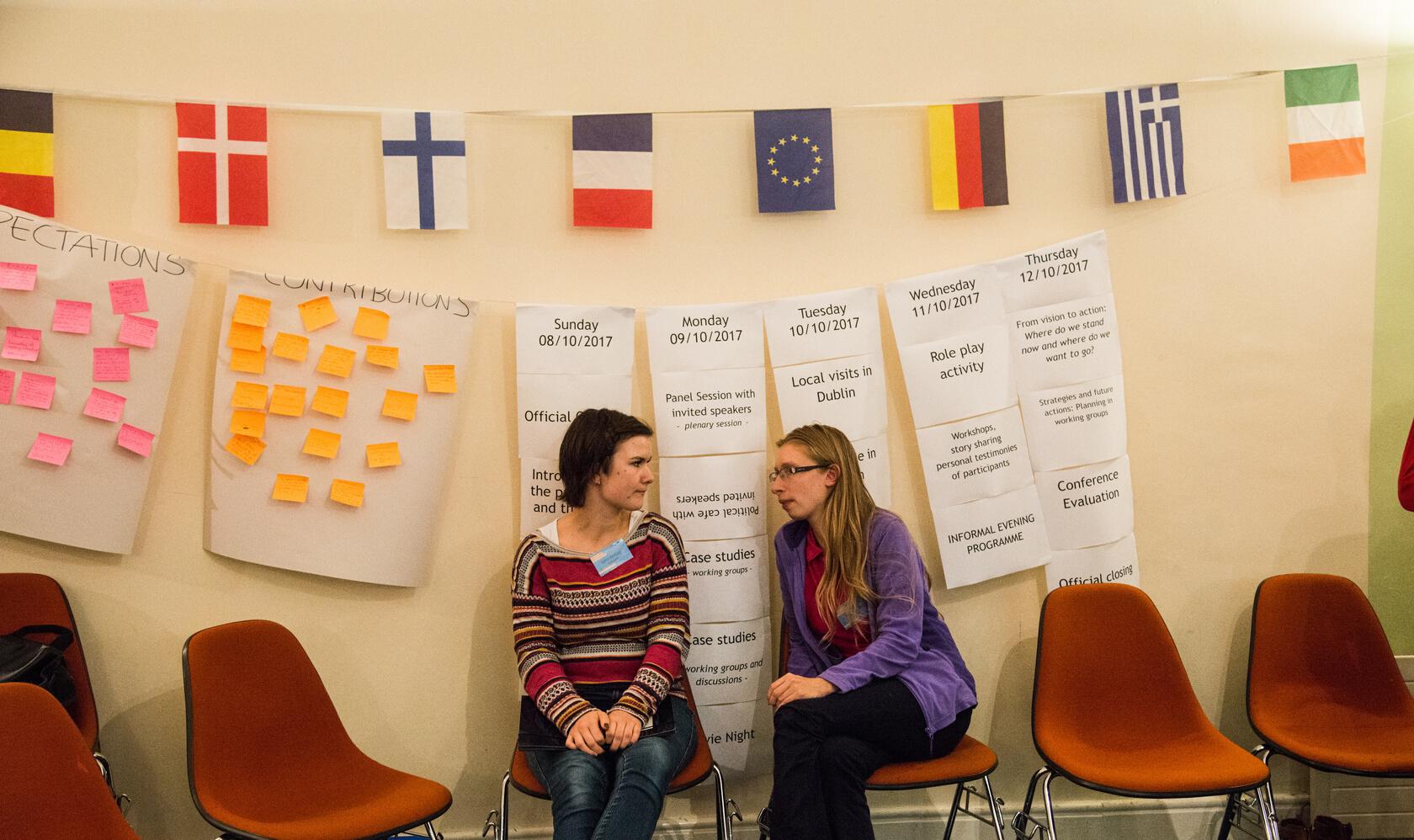
Email: manavska pale@hotmail.com
ROMANIA AsociațiaMIRA
Email: asociatiamira@gmail.com
SPAIN MiliciadeSantaMaría
Email: egurazariquiegui@gmail.com
UKRAINE SCMUkraine
Email: anna.lavryk@gmail.com
During 2018-19, WSCF-Europe organised two capacity-building trainings, focused on developing the awareness and skills of members of Student Christian Movements (SCMs). Equipping young people with this knowledge was essential in ensuring that difficult topics, such as hate speech and youth extremism, are then discussed within local/national communities in a meaningful manner
Our capacity-building training, focused on media literacy and hate speech, was delivered in May 2018, in Palermo, and ran alongside our Staff and Officers Meeting 22 delegates, representing 13 different countries from across Europe, attended the training on the Italian island of Sicily The event was hosted in the building of the Centro Diaconale “La Noce” – Instituto Valdese, an organisation that does significant integration work for the local community. The training was financially supported by the European Youth Foundati of the Council of Europe and Otto Per Mille the Waldensian Church of Italy

The main aim of the training was to equ participants with the right questions and to that allowed them to think critically about t ways in which the media portrays certa groups and individuals, and how these c lead to stereotyping and a perpetuation prejudices already existent in our societi These misrepresentations can span a range topics and local contexts – from anti-LGBTQI+ rhetoric to negative portrayals of refugees, in countries around Europe
Most of the training was delivered and guided by Cécile Goffard, animator, educator and coordinator of media education projects, who is a speciliast in the topics of anti-racism, discrimination, intercultural communication. The WSCF-Europe Preparatory Committee also delivered a number of sessions during the training, and took care of the practicalities involved in hosting the event.
The participants had the chance to hear from a number of other speakers. Torsten Moritz, Secretary General of the CCME - Churches’ Commission for Migrants in Europe, talked to them about human rights and the situation of refugees and asylum seekers in Europe Alberto Mallardo talked about Mediterranean Hope, a project of the Federation of Protestant Churches in Italy, which involves work with refugees and asylum seekers in Lampedusa and Sccili, Italy.
"I'velearntalotthisweek.Throughouttheweek wehadagoodmixofdiscussions,groupexercises andlecturesonvarioustopicsrelatedtothemain theme(medialiteracy).Wesatindifferentgroups eachtime,whichhelpedusgetfamiliarwitheach other,andlearntalotfromandabouteachother. I'velearntalotaboutatopicIneededtobecome moreawareof.
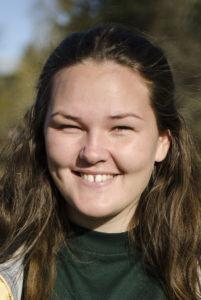
Thisconferencehasalsogivenmetheopportunity tobuildrelationshipswithpeoplearound Europe.Ithasbeenveryhelpfultohearthe experiencesofothers,howtheydothings,andI haveagreatdesiretovisitmanyofthe movementsI’veheardabout,tolearnevenmore aboutwhattheydo.WhatiscertainisthatIhave noregretsaboutattendingthisconference. Sometimesyoujusthavetojumpintothe unknowntolearnandexperiencenewthings..."
This work includes: analysis and information on migration flows via the Mediterranean, reception and orientation of migrants and asylum seekers, integration programs, and action aimed at promoting effective migration policies that respect human rights

The event concluded with an action planning exercise, through which participants were encouraged to think about the activities, events and actions that could be delivered in their local community, through their local or national SCM or other means, in order to combat some of the negative narratives surrounding different groups and individuals

In November 2019, we organised another capacity-building training, this time focused on the topic of youth extremism. The training took place in Utrecht, and was delivered in partnership with the Dutch SCM, S.S.R.-N.U. and through funding received from the European Youth Foundation of the Council of Europe and Otto Per Mille of the Waldensian Church of Italy.

19 participants from 13 countries gathered in Utrecht for this training. The programme included a series of workshops focused on the development of practical skills, such as: community building, advocacy, campaigning and social media. The workshops empowered SCM representatives and other participants, giving them the right tools and knowledge to return to their communities and, in turn, empower others to identify and challenge extremism. These skills were explained and applied through discussions and exercises centered on extremism/radicalisation and what can be done to prevent and combat it.
These key themes were also explored through plenary sessions, which included hearing and learning from Miguel Garcia, an expert in this field Since 1998, Miguel has worked as an evaluator, trainer, lecturer and e-learning moderator for the Council of Europe, the European Commission, the Universities of Hannover and of Osnabrück, and many other organisations, conducting research and helping young people and others to explore topics relating to extremism.
The participants had the chance to get involved in different thematic and reflection groups, in which they could share the realities and different forms of extremism they have experienced or witnessed in their own countries. As the programme came slowly to an end, participants were asked to work in groups to develop a joint manifesto on their commitment to stand against extremism, to face it and challenge it in an effective manner. It is perhaps this commitment that remains as the key legacy of the training!
2-6November2019,Utrecht,theNetherlands
innovationforcombatingyouthextremism"
“As Christians, people of faith, and men and women of good will, we cannot turn a blind eye to the problems of our age, and we believe that keeping silence in this difficult hour would be a grave moral failing from our part. We seek to give voice to the voiceless and be a prophetic presence shininginanoftendarkworld.Itisforthisreasonthatweaskyoutotakeourproposalstoheartand take our letter as a serious call to action from the concerned young people of Europe (…). These reflections were developed in the context of religious and cultural sharing activities, and the program was enriched by contributions from various participants in specific parts of the training, in which we shared our experiences and discussed what would be the best practices that lead to cooperation, intercultural exchange and interfaith dialogue. As a new generation, we aim to put them into action because we know that all of us will help to create a more open, diverse, interactive andcriticalyoungEurope.”
“Thefirstthingthatcomestomymindwhen thinkingabouttheyouthtraininginUtrechtis thevarietyofsessions,fullofvariedinformation anddiscussions.Priortothetraining,Ididnot expecttomeetsuchaspecialgroupofpeople,of diversebackgrounds,knowledgeandexperience. Ididnotonlygetthechancetolearnaboutyouth extremismandhowwecancombatthisissue,but alsoaboutthedifferentsituationsinEuropean countries,aswellastheroleandinvolvementof theSCMs.Afterthose7days,Iwenthomefilled withmotivation,ideasandexcitementtostart activitiestofaceyouthextremi
HenrietteGreulic SCMDresde
“Fantastictrainingprogramme-itisdefinitely somethingIwillremember.Everyone'sattitudes andperspectiveswereveryinspirational. Simultaneously,Ireallyappreciatetheeffort fromtheorganisationteam'ssidetoprovideus withadynamic,yetveryinformational,training programme.Itwasverywell-balancedand thought-through.Icanonlythankthem!”
Feedbackfromtrainingparticipant

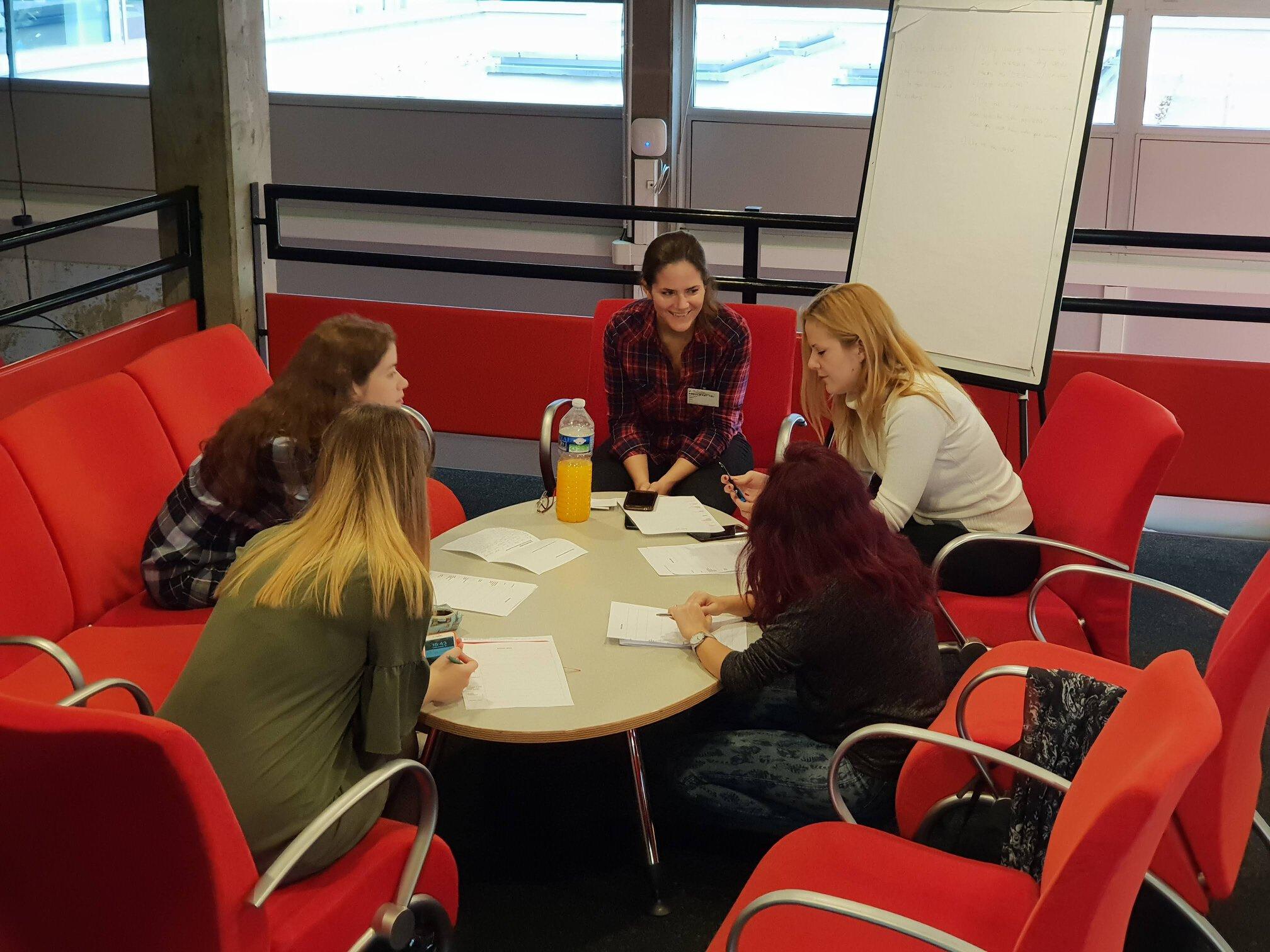
One of the essential pillars of WSCF-Europe’s work is that of building bridges between different Christian denominations, and between Christianity and other religions. Religion is a uniting element that should lead to cooperation, and bring people together in peace, and not to wars, distance and separation With this in mind, during 2018-19, we organised a number of events focused on interfaith dialogue and peacebuilding.
30 participants, representing 16 countries from around Europe and beyond, attended our study session on how to make peace possible, which took place in the autumn of 2018 The session was implemented in cooperation with the Council of Europe Youth Department and held at the European Youth Center in Strasbourg, France. The conference aimed to challenge young people to think about the need for, and ways of creating, peaceful communities.
We partnered with the Middle East region of WSCF to ensure that our dialogue gained a new perspective. Participants from the Middle East joined the conference, and together with the European participants, explored the meaning of peaceful communities, challenges faced when attempting to build them, and ways of surpassing barriers. Contrasting local and national contexts helped participants tease out the different meanings of peace and the sensitivities involved in advocating it.
Amongst the speakers, who guided the participants through the complex question of how peace can be achieved, was Dr Nagypál, Szabolcs, a senior lecturer at the Eötvös Loránd University in Budapest, Hungary. Dr. Szabolcs specialises in legal ethics, mediation and alternative conflict resolution, as well as ecumenical and inter-religious dialogue.
During the conference, the participants learnt about the different religious perspectives on
peace, discussed the role of human rights protection, advocacy and ecumenism in achieving peace, analysed case studies from across the Globe, and thought about the role of young people in conflict transformation and peacebuilding They were also presented with a number of tools that could help them deliver education activities, mediation and youth work in their local communitiese
"IwouldliketothankWSCFfororganisingaverysuccessfulstudysession.Itwasaverywell-organised event,andthebeautyofthesessionwasthatitrequirednoprerequisiteknowledgetoattend.Thesession wasintroducedwithbasicunderstandingsofpeace,followedbydefiningpeace,educatingusonthelegal andpoliticalaspectsofrestoringpeace,withlivingexamples,andfinallyevokingtheinstitutions,for eachparticipanttomakeachangeintheirowncommunity/country.Itwasverymotivationaland inspiringtomeetpeerswithanimmensedrivetomakeagenuinedifference.Someofthecandidates sharedtheirfirst-handexperiencesgoingthroughseriouscatastrophes,whichmostoftheworldonly getstowitnessthroughthemedia.Thankyoutoalltheparticipantsforcontributingheavilythroughout thesession,makingmerealizethattherecouldbemorethanonerightanswertoeveryproblem.Finding thenarrowlinebetweenconflictswheremoralconsciencesareupliftedwillbringoutthebestinevery situationandgivesarealmeaningtohumanity.Onceagain,congratulationstothewholecrewfor pullingoffagreateventandthankyousomuchformakingmeapartofthissession."
IndianOrthodoxChurch Representative,Ireland“Ihadanopportunityandagreatpleasuretobethepartofthestudysession.Itwasanamazing experience,asIhadthechancetomeetwonderfulpeople,withlotsofknowledgetoshare.Itwas inspiringtomeetpeoplewhoarealreadydoinggreatthingstowardscreatingpeace.Oneofthemost inspiringthingswastheworkshoptitledthe‘livinglibrary’.Ialsolovedtoworkinsmallgroupsto createaplan/projectforthenearfutureforustorealise.Ithelpedustousedirectlytheknowledgethatwe havereceivedduringthestudysession.WealsogotthechancetoseehowtousetheCompassmanualfor teachingabouthumanrights.Allinall,thestudysessionwasfullofemotions.Wehadsomuchfun singing,dancingandtalkingtoeachother.Everyonewasextremelyprofessional,butatthesametime fullofloveandrespect.Itwasorganizedverywell,anditwasverynicetohaveaCouncilof Europe representativepresent,whosharedlotsofinterestinginformation."
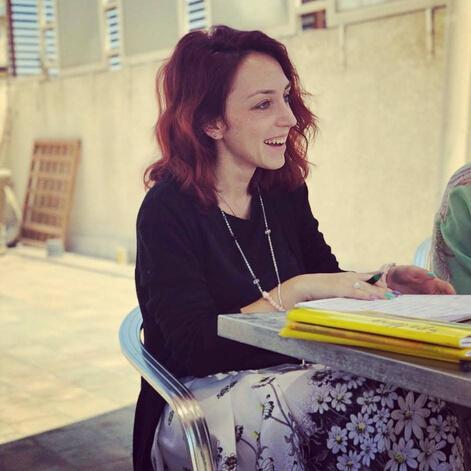
SCMArmenia

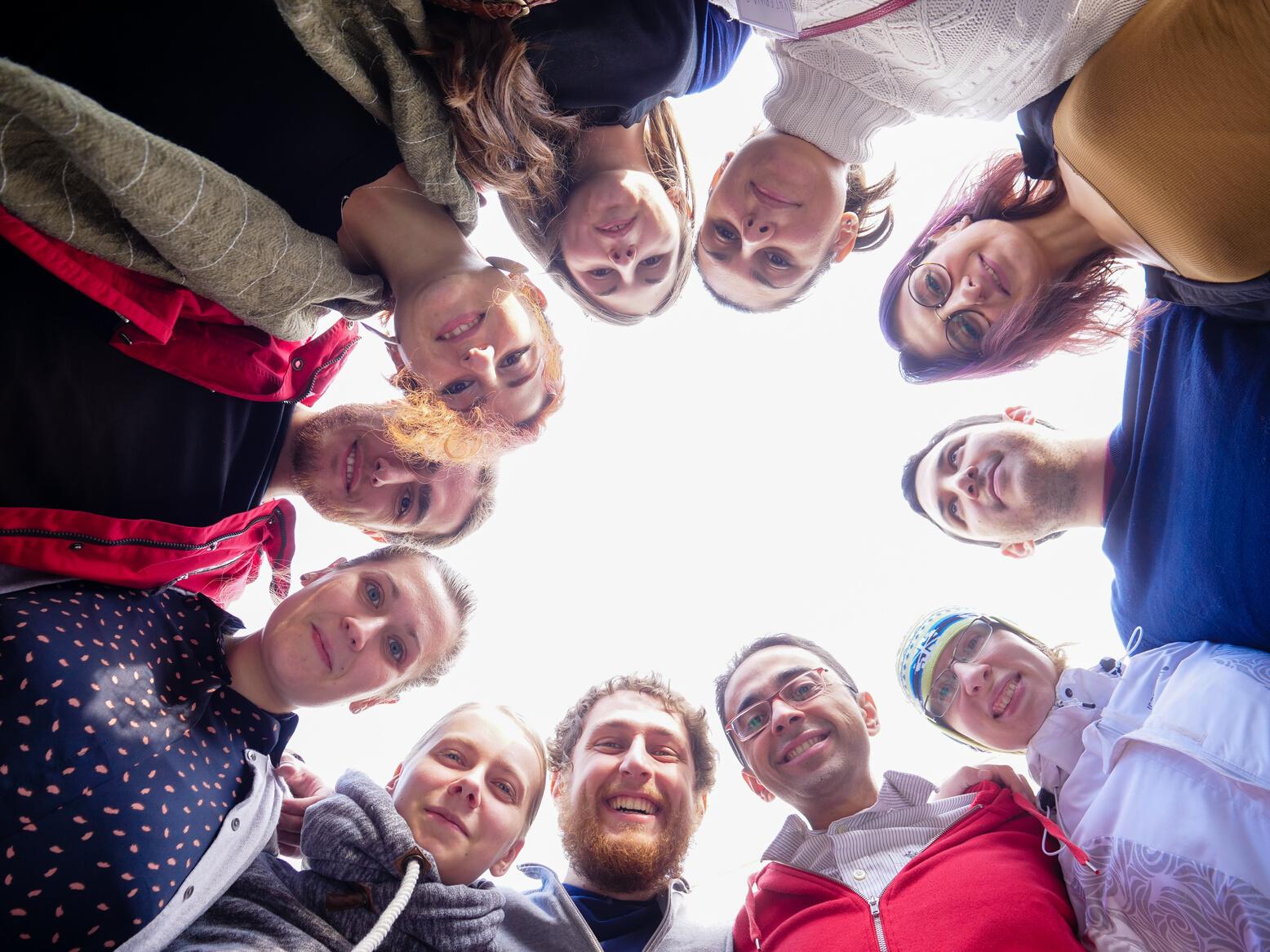
In November - December 2018, our conference “Humanity reclaimed: youth perspectives on diversity and inclusion” brought together 16 participants from 9 countries in Thessaloniki, Greece. The conference focused on the challenges that diverse and inclusive societies are facing, and how this is impacting on people’s vision of the future. A lack of optimism towards the future can lead to people turning inwards, closing themselves and their communities, not allowing newcomers to be integrated and regressing to old patterns of thinking These ideas were discussed during the conference, which was financially supported by the European Youth Foundation of the Council of Europe.
The discussions were deepened by the insights offered by a series of exceptional speakers.
Prof Niki Papageorgiou, Associate Professorof Sociology of Religions and Ethics in the Faculty of Theology of Aristotle University, opened the conference with a keynote on defining diverse societies. Alexandra Zosso joined the group later on to present her work with Northern Lights Aid, an NGO that works with refugees and asylum-seekers in Greece Father Athenagoras Loukataris also joined the conference and introduced to the group his work with Roma children in Thessaloniki, where he established a youth centre known as Faros tou Kosmou (Lighthouse to the World). These examples of good practice in doing work to integrate minority groups were inspiring to the participants, who felt that such efforts could be replicated in their local contexts
On the fourth day of the conference, the participants visited a number of local initiatives, whose work focused on the integration of refugees and asylum seekers This included a visit to the Aristotle University, where a number of academics started the S U C RE project, which provides guidance for social workers and other practitioners working in refugee camps and with minority groups It also included a visit to the offices of Antigone, an NGO working on racism, discrimination and human rights issues since 1993
The examples highlighted through the talks and visits were complemented trough activities in which the participants learnt more practical skills, such as how to run their own advocacy campaign. The key aim of these activities was to empower young people to challenge hopelessness feelings in discussions around human rights issues, and to promote instead a proactive and hopeful approach towards social action and change
"It emerged that often, even among the youth, the relationship between the testimony of faith and thehumandimensionofsocietyislost,attributingtheresponsibilitytoexternalfactors,suchasthe political choices of national and continental institutions. But for WSCF-Europe, this loss is unacceptable, and it is rooted in the shortage of adequate ecumenical responses to the challenges facingtheEuropeansociety,likethereceptionofmigrants."


ExcerptfromanarticleinL'OsservatoreRomano,thedailynewspaperofVaticanCityState,owned bytheHolySee,abouttheconference"HumanityReclaimed".
“Ifirstheardaboutthisconferencefromafriend ofafriend,Iwasn’tpartofanyofthestudent Christiangroups.Sofar,ithasbeenanamazing experience!Someofthestorieswe’veheardhave beenjustamazingstoriesofhumancompassion, andoftheresilienceofthehumanspirit,inspite ofeverythingthat’sgoingwrongwiththeworld rightnow.I’mjustgenerallyreallygladthatI’ve hadtheopportunitytocomehere,tomeetalotof amazingpeople,fromalloverEurope,andnot onlyEurope.”
“Thebestpartoftheconferencewasthatit didn’tactuallyfeellikeaconference,because itwasveryinformalandwegottobefriends, notonlywiththeotherparticipants,butalso withtheorganisingcommittee,thatwas participanttoeveryevent.”

As an organisation that aims to bring together Christian students from a variety of backgrounds, WSCF-Europe works with students interested in the spheres of theology and ecumenism. As a result, fostering ecumenical leadership amongst our SCMs and beyond is a key focus of our work.
In May 2019, we were happy to be able to revive our Lingua Franca Programme, which first took place in 1991. The programme was a one-week long leadership training, focused on the subject of “Shared future, shared responsibilities: empowering a new generation of Europeans”. The training was delivered in Kobuleti, Georgia, and was made possible by funding received from the Otto Per Mille of the Waldensian Church of Italy.
The training brought together 14 participants, from 6 countries in Europe and beyond. The programme was designed as a series of visits to local organisations, guest speaker sessions and sessions in which the participants could learn from each other. The key aim of the training was to bring young Christians, mostly from Central and Eastern Europe, to share and discover different realities, country-specific issues, and to inspire them to get active and promote ecumenism and inclusion in their own communities.
Every day of the programme started with a different reflection, connected to the topic of the day, and each of the participants could share a piece of their home church tradition
Before the training, the participants were asked to collect information and to research their local communities, to understand specific issues that minority groups might face. Sharing those different realities was an eye-opening moment, where participants discovered how diverse our societies are and, at the same time, how a lot of the issues faced by minority groups are common United by these challenges, many of which were shared, participants brainstormed possible solutions and put together action plans to bring forward change in their local communities. The findings of these discussions were included as key recommendations in the Joint Appeal to the European Churches, that the participants produced at the end of the training programme, with the hope to convey the youth voices for diversity, inclusion and tolerance The participants also visited the Catholic Church in Batumi, two Orthodox churches and the International Fellowship of Students in Georgia. Through these visits, they explored the realities / challenges of different religious organisations and minority groups in Georgia
Participants felt that, by offering a safe common space where they could freely express themselves, the training helped them improve their public speaking skills, which they practised through Bible studies, workshops and ecumenical prayers, that were all carried out in an interactive manner. This accepting environment and open floor for anyone to participate made the event constructive and fruitful, giving the whole training programme a healthy and unique atmosphere.
"Themostexcitingpartofthistrainingwasthe opportunitytopracticetheskillsofdeveloping plansandstrategiesfordifferentadvocacy campaigns,onimportantsocialissuesrelevant worldwide,togetherwithanincredible internationalteam.Thethingswelearnthrough sharingourrealitieshelptogetabiggerpicture ofwhatthefutureholdsforusandhowwecan actuallycontributetoit.Greatteamwork, improvementofcommunicationskills,highly informativemeetingsandpracticalactivities gavemeasolidbaseforimplementingreal changesinmylocalcommunityandmade LinguaFranca,inGeorgia,atruly unforgettableevent.”

“Webelievethatitisourroleasyouth,tonotremainsilent,aswearethefutureofourchurchesand are the guarantee of the ongoing faith and of the glorification of the name of our Lord. We believe that nowadays the world needs the church more than ever, because it is facing difficult and crucial challenges regarding freedom, immigration, acceptance and experiences war, famines, hate speech and crimes. The church could take the role of the leader by giving a positive example on how the worldshouldliveinunityforthechurchbybeingtheharbingerofthekingdomofGodonEarth.
But this will never happen without unity within and between the church, without solidarity and tolerance between the churches of different traditions, and we will never reach that goal without having real discussions, shaped by acceptance, honesty and equality, and real integration and inclusionoftheyouthandofalltheminoritygroupsalsoonadecision-makinglevel.

Diversitynevermeansdivision,diversityisrichness.”
Our SCMs are the heart of our organisation, and much of the work we do is aimed at empowering members of SCMs to bring forward change in their communities, to become leaders and promoters of ecumenism, social action and human rights. In 2018-19, we went out of our way to support SCMs, both through our capacity-building and ecumenical leadership trainings, but also through encouraging and supporting local initiatives. In 2018, we offered funding to SCMs and worked with them to organise local events focused on country-specific social issues. In 2019, we encouraged and supported SCMs to research and reflect on the issues that characterised their local contexts, and also to organise events that aimed to find solutions to those challenges.
17November2018,Helsinki,Finland
"Keep in mind that you cannot know beforehand where exactly the dialogue will take you." This was the opening reflection that our former Campaigns Coordinator, Pavlina Manavska, used to open a workshop on religious dialogue and cooperation, that was organised as part of our 2018 campaign “One for All All for one”, on 17 November 2018, in Finland The event was led and hosted by Suomen Kristillinen Ylioppilasliitto, our SCM in Finland. Together with the religious dialogue specialist, Heidi Rautionmaa, around 15 students reflected upon what dialogue means and how dialogue and cooperation with "the others" can be started Great discussions and best practices about how diversity brings positive change and enriches our life filled the day Such dialogue is a contribution towards helping people of different religions grow in mutual understanding and finding a common cause in social justice and religious liberty

"Ilearnedintheworkshopthateveryonewhois open-minded,braveenough,andreadyfor mutualityiscapableto(getinvolvedin) interfaithdialogue.We allrepresentourselves, notourchurchesorwholereligion.Thebestway tohaveaconversationistohaveapersonal contact.Youcanthinkofinterfaithdialogueas levelsor floorsof ahighbuilding,youcanchoose thefloororthelevelwhereyoufeelsafeandit's okaytobethereandnotgoingnextfloor,ifyou don'twantto.”
On 26 November 2018, WSCF-Europe, in collaboration with local Dutch SCM S.S.R-NU, organised the event “WSCF meets Utrecht: Practical idealism at S S R-NU”, which took the form of a jointly-delivered workshop. The workshop was part of WSCF-Europe’s “One for all All for one” campaign, delivered through funding received from the European Youth Foundation of the Council of Europe.
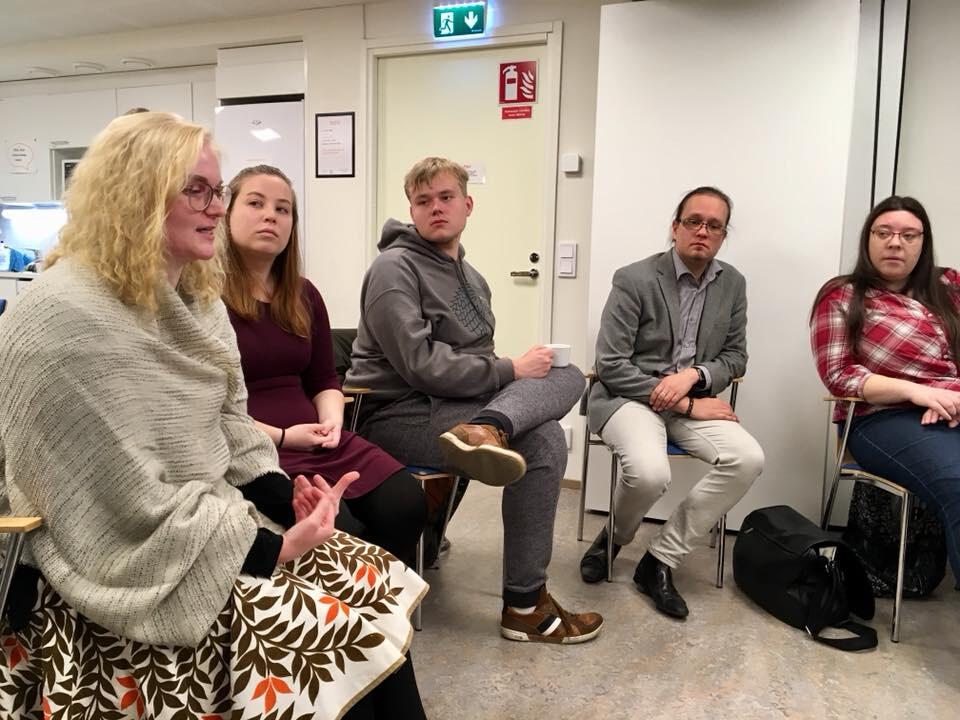
During the workshop, participants heard different stories of diversity and inclusion, and brainstormed on actions that could be undertaken to make their local community, in Utrecht, more inclusive. Moreover, our Campaigns Coordinator, Pavlina Manavska, attended and presented the work of WSCFEurope and opportunities for young people to get involved. Jannes Herman Mostert, International Coordinator for the NGO The Tree Party, attended the event as a speaker, sharing with the participants his personal experience and expertise
17 students attended the workshop and emerged themselves into the topics of focus, thinking through ways in which young people could bring about change in our society

"SometimesIthink:‘Iamtoosmall,can’tdo anything’.Andthenitoccurstome:‘IfIcan managetostartandnotgetdiscouraged,the strengthwillgrow.AndthenI’mastonished:I amnotalone.Manysmallonesarejoiningme.”
From 26 to 28 November 2018, SCM Britain organised the event “Interrupted by God”, which WSCF-Europe was invited to attend The event constituted of a weekend retreat, during which a small group of students got together to pray and reflect on the meaning of social action in driving forward change. On the second day of the retreat, the students attend a series of talks and workshops, organised by Project Bonhoeffer, which were
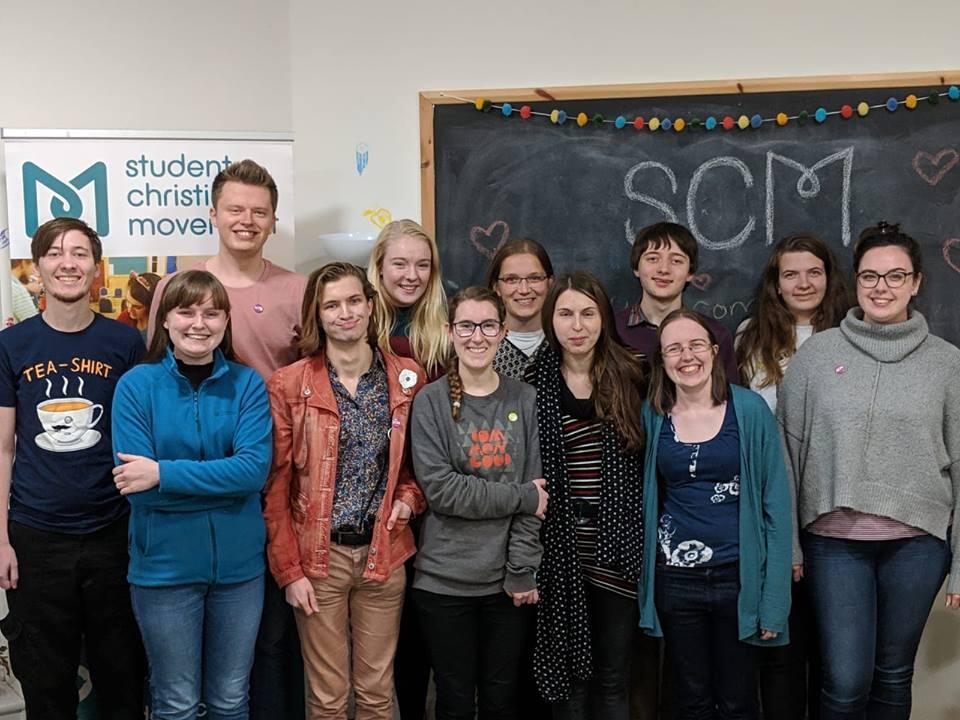
brought together under the title “Faith in political action”. A number of prestigious speakers attended these events, including Dr Jennifer McBride, Assistant Professor of Theology and Ethics at the McCormick Theological Seminary, United States Our Communications Officer, Maria Atanasoaei, attended the SCM’s retreat, presenting WSCFEurope’s work and highlighting possibilities for young people to get involved.

“Oneofthereallygreatthingsabouttheconferencewasthehugemixofagesandexperience,fromthe groupofSCMstudentsfromaroundthecountry,toothervisitors,somefromLeeds,andsomefrom furtherafield.Meetingolderpeoplewithsuchapassionforputtingfaithintoaction,someofwhomhad beenpartofSCMGroupswhentheywerestudents,wasagreatexperience.Whenyou’reastudent surroundedbymainlyyoungadultsitcanbereallyeasytofeellikewe’retheonlyoneswhocareabout issuesofsocialjusticeandenvironmentalprotection.However,it’sreallygoodtoberemindedthatthere arelotsofotherpeoplewhocare,manyofwhomareolderandcansupportusandgiveusadviceforhow wecantackletheseproblemstogether.Beinganenvironmentalorhumanrightsactivistoftenfeelslikea constantfight;againstlargeorganisations,ourowngovernmentandthoseofothercountries,andloads ofmisinformation.Knowingthatwehavehelptocarrythatburdenisreallyencouraging."
The workshop “Together towards inclusion and unity” was organised in Strumica, North Macedonia, and focused on the topics of radicalisation, isolation and extremism, and what young people can do to address these issues in their communities. The topics were explored from a religious perspective, as the workshop involved participants from different religious traditions and backgrounds. Some of the young people that attended the event still lived in countries that face major political, economic and social challenges. In some countries, religious-based discrimination and exclusion, often fueled by political motives, became more vivid over the last years. The workshop facilitators encouraged young people to share their lived experiences, but also to search for hope and solutions.
The workshop allowed participants to develop strategies and ideas that can be achieved and implemented together, and that focused on the things that united them as religious young people. This offered them an opportunity to reflect on and understand their role as Christian youth in society
“We want to eliminate and fight against extremism and all kinds of violence and radicalisation towards minority groups and disadvantaged people!” - this was the message that the participants came up with as a joint statement that reflected their discussions and commitments during the workshop
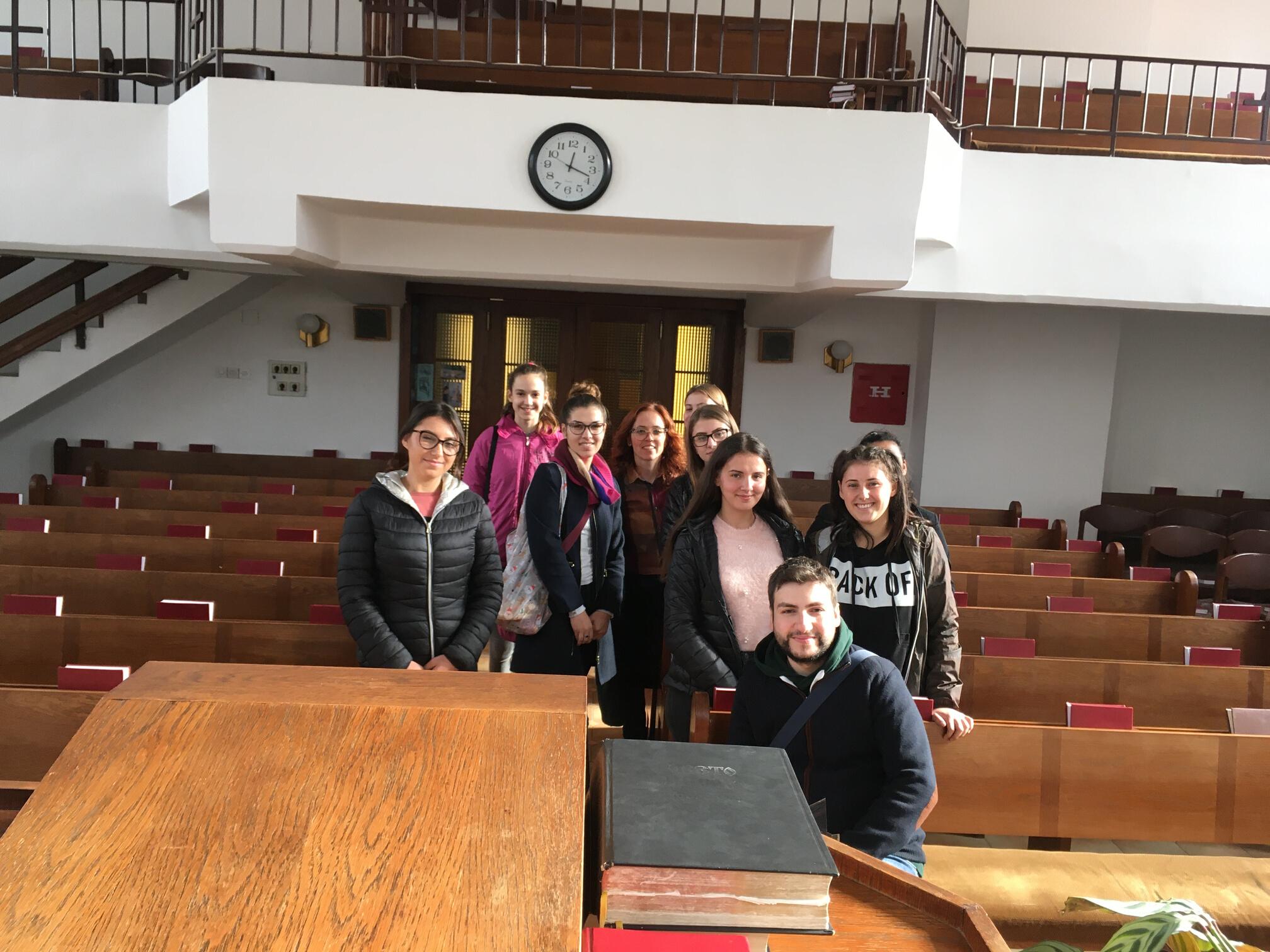
"AsayoungpersonlivinginMacedonia,Imust saythatthechallengesofprejudiceand extremismarereallyhighanditissoeasytoget manipulated.Thepoliticalsituationandcrisis arenothelping-infact,theyare polarizingthe societyandtheyoungpeople.Inorderforus,and byusImeanyoungpeoplewhoarestilllivingin thecountry(asmanyemigratedtobetter developedWesterncountrieslikeGermany, Switzerland,Englandetc.),tocontinuetofind waysofdealingwiththehighunemployment rateandthecorruption,averyimportantwayof doingthisisbybuildingrelationships. Themore contactIhavewithdifferentpeople,themoreI realisethereareotherwaysofthinking,andthe morewelearnfromeachother.
Thisworkshop,althoughjustforaday, helped merealisethatIamblessedtoliveinan environmentwhereIcangrow,exploreandlive inpeacewithpeoplefromdifferentreligious backgrounds.Thiswastheopportunitytocome together,throughgamesanddiscussions,toget toknoweachotherbetterandtocometothe conclusionthatdeepdownwesharethesame valuesandrunthesamerace.Challengeswill come,buttogetherwecanovercomeandputa stopforthenegativeinfluenceandhatespeech provocationsthatonlyleadtoseparationand isolation.Wewouldlovetohavemoresimilar activities,aswebelieveasChristians,Godcalls ustostandtogether."

"Allpiecesfittogether"
The workshop “All pieces fit together - on spotting and combating extremism in church and society” took place on 23 November in Berlin, Germany, and was organised in cooperation with the European Christian LGBTQI+ Forum. The workshop participants were young people from the LGBTQI+ community or those young leaders who work with this group in their countries. Most of them came from countries in which isolation, exclusion, discrimination and violent extremism towards minority groups are everyday realities.
The workshop was facilitated by the Pavlina Manavska, our Campaigns Coordinator, and involved young people coming from Ukraine, Russia, Germany, Poland, Denmark and England. During the workshop, the participants reflected on what extremism is,
on the different forms of extremism leading to violence and on how we can explain the influencing factors leading to radicalisation.
The participants identified and worked on three different factor categories: factors relating to the individual, relational factors, ideological / religious factors and community / institutional factors

The most important part of the discussion was the one in which the participants shared personal stories / experiences from their local
communities. This highlighted that even if realities are different in different European countries, still the issues people face have the same, or very similar, contributing factors. This led the group to conclude that more platforms should be created where young people can learn from each other’s experiences on how to deal with the youth radicalisation and extremism issues
Another youth-led initiative was organised in November 2019, in Kiev, Ukraine, and carried the title “Anatomy of Extremism” The training session aimed to explore the different concepts of extremism, extremism leading to violence, radicalism, populism, and to understand their meaning in the Ukrainian context. The meeting gathered 15 young people and was guided by an expert in human rights education
The participants watched a few excerpts from national news, which mentioned the word “extremism” in various situations. The cases presented involved right-wing radicalism towards different political parties, aggression
towards feminism, and discrimination and violence against different religious groups. All those cases showed a wide range of emotions and different levels of violent actions - from moral pressing and hate speech, to the destruction of property and murders.
At the end of the training, all the participants had a task to create communication strategies on how to inform young people and older generations, as well as different social groups, about the risks of extremism leading to violence and ways to prevent it
"First of all, let me express my gratitude for the organisation of the training on combating youth extremism. This topic is very relevant for Ukraine. Discussion of national and international practice creates understanding of the issue and possible solutions, (it) creates connections between active members of civil society. I noticed that all the participants had absolutely different backgrounds. All of themexpressedpositiveopinionsaboutcontentofthetraining,trainersandactivitiesorganised.Thank youforputtingsomucheffortintothistraining.Andgoodluckinyourfutureendeavors."
"I learned a lot of new things about extremism among young people. I have never learned this topic in detail (before). I understood then that it isnotonly(a)politicalorsocial,butalsocultural problem. I liked the speaker very much. She was averyhighlyqualifiedspecialist.It(thetraining) was organised really well. I liked that really warmatmosphere."
WSCF-Europe Student Christian Movement in Belarus hosted a seminar that engaged young people in critical reflection on the topics of violence and fundamentalism, particularly on how fundamentalism and extremism can lead to violence, especially among young people The focus was on the Belorussian context, and participants reflected on the negative and positive role of religion and the church, and how youth can play a role in bringing about positive societal change.
The topics discussed during the seminar were important and relevant for young theologians and members of the ecumenical movement in the country It’s not a popular topic of theological and political reflection in Belarus to see the church itself, its doctrines, practices and structures, as a part of a problem
This sometimes leads to situations in which hate speech, in the name of God, is not being challenged, situations of oppression in the church itself, or situations in which, in public debates and in important cases of violence in Belarus, major churches take the side of oppressors and perpetrators, the side of the government and not of the human rights activists. Among the major concerns presented was also the fact that the church is silent, not speaking out on the issues of death penalty and repression against minorities. The participants also discussed the role of the church in gender equality and in challenging domestic violence. “It is time to question ourselves, our communities and our leaders,

and that’s a task for young people as Christians, to provide critical reflections and to detect the main problematic areas in the context of the Belorussian society” – this was the key message that the facilitator of the seminar shared with the group

"It is said that Saint Nicholas once saved two prisoners the last moment before their unjust execution Not everyone sentenced to death can hope (for) such a protector. And can the capital punishmentbejustatall?"

Illustrationandtextby
During the seminar, the group created a list of problems and cases that were important for the Belorussian society and matched this against what young people can do in certain cases, as members of NGOs and churches. Another interesting output of the seminar was a visual project on the issues of religion, extremism, fundamentalism and violence. This illustrations produced as part of this project were included in the WSCF-Europe Ecumenical Journal “Mozaik", in the issue dedicated to the topic of youth extremism AndrejStrocaŭ
"The event reunited the Belorussian researchers working in the fields of theology and religious sciences, writing in different languages and representing various Christian confessions. One of the questions the meeting tried to address was 'What is violence at all?' For it is both evident and a quite mysterious phenomenon, which cannot easily be measured by some physical or social characteristics. Meanwhile, thediscussionaboutviolenceisurgent.Ontheglobal,regionalandnationallevels,knowingthatthereis ongoing war between Russia and Ukraine and that in Belarus capital punishment is still a major problemreflectsthisurgency.”